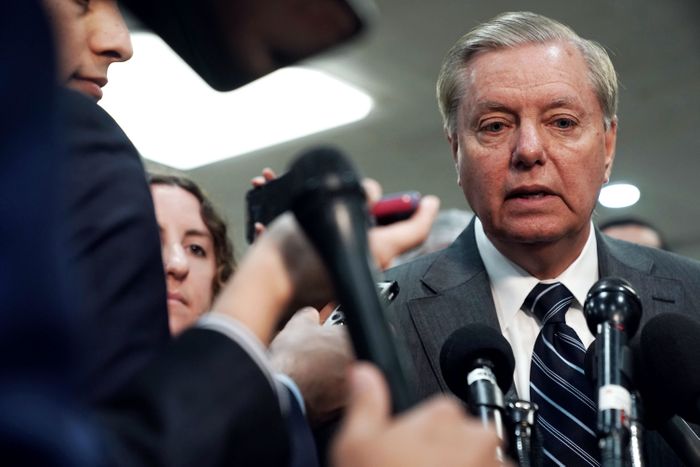
The United States has been helping Saudi Arabia bomb and starve the Middle East’s poorest country for about three years now. One recent estimate suggests that 85,000 children under 5 years old have already died from malnutrition as a result of Riyadh’s intervention in Yemen’s civil war. If the Saudis’ air strikes and blockade continue, Yemen is poised to face the worst famine that humanity has seen in 100 years, according to the U.N.
Eight months ago, the fact that Saudi Arabia was routinely dropping American-made bombs on Yemeni school buses and hospitals — and in the process of deliberately starving tens of thousands of children to death — was not enough to persuade the Senate that the United States should cease supporting the Saudi campaign. Back then, the upper chamber declined to even allow extended debate on a bill that would have ended such support.
But then, Saudi agents murdered and dismembered a U.S. resident who wrote for the Washington Post, and had personal relationships with influential people in our nation’s capital. And, for whatever reason, this convinced a critical mass of U.S. senators that not supporting war crimes in Yemen was, at least, an idea worth considering.
In a last-ditch effort to change their minds, the Trump administration sent Secretary of State Mike Pompeo and Defense Secretary James Mattis to the Senate last week, to brief all 100 lawmakers on the case for maintaining U.S. support for the Saudi war in Yemen. But many senators were less concerned about the pros and cons of abetting war crimes than they were with whether Saudi crown prince Mohammed bin Salman (a.k.a. MBS) had ordered the murder of Jamal Khashoggi (the Washington Post columnist who knew some people whom they also knew). They specifically wanted to hear from CIA director Gina Haspel on that subject, since her intelligence agency had been strongly suggesting that it had proof of the crown prince’s guilt, even as the Trump administration insisted that no such proof existed. But Haspel did not attend the hearing — and Pompeo and Mattis would only reiterate the White House’s position that the U.S. possessed no “direct” evidence that MBS was involved in the killing.
According to ABC News, several senators were so furious about Haspel’s absence, and “unhappy with the administration’s lack of answers and unwavering support for the Saudis despite the murder of Khashoggi,” they decided to green-light debate on withdrawing U.S. support for starving Yemeni children, so as to send a message to the administration about the need for more information about Khashoggi’s death.
On Tuesday, as the Senate prepared to (finally) allow a vote on the Yemen resolution itself (as opposed to a vote on merely whether the bill merited debate), the White House sent Haspel to brief eight senior senators on what the CIA knew of the Khashoggi killing, in hopes that this would appease the lawmakers, and assure the resolution’s defeat.
Republican senators emerged from that briefing so certain that MBS ordered the journalist’s murder, they might not want the United States to help him kill Yemeni children anymore.
“I have zero question in my mind that the Crown Prince MBS ordered the killing, monitored the killing, knew exactly what was happening. Planned it in advance. If he was in front of a jury he would be convicted in 30 minutes. Guilty,” Tennessee senator Bob Corker told reporters.
South Carolina’s Lindsey Graham echoed that sentiment, saying, “You have to be willfully blind not to come to the conclusion that this was orchestrated and organized by people under the command of MBS.” Graham further said, in reference to the White House’s claims that the U.S. lacked “direct” evidence, “It’s not a smoking gun, it’s a smoking [bone] saw,” and that if Mattis and Pompeo were Democrats, he’d be “all over them” for their dishonesty (ostensibly admitting that he is a partisan hack who will ultimately let their dishonesty slide because they are Republicans).
It is unlikely that Corker will vote for the Yemen resolution — he voted to advance the bill to debate last week, but stipulated that he was only trying to send a message to the White House about his desire to see more information about Khashoggi’s killing.
Alabama Republican senator Richard Shelby, meanwhile, appeared to express a desire on Tuesday to find some way of sanctioning the Saudis’ murder of a U.S. resident with ties to D.C. elites, while still maintaining American support for the Saudis’ mass murder of Yemeni children. “This is conduct that none of us in America would approve of in any way,” Shelby told the New York Times. “Somebody should be punished, but the question is: How do you separate the Saudi crown prince from the nation itself?”
But Graham suggested that the Khashoggi killing had led him to conclude that America must withdraw military support for the war in Yemen. The senator stipulated, however, that he will be voting against the pending resolution that would actually do that, as he would rather rally support for a separate bill, which would include sanctions on those responsible for Khashoggi’s death.






























